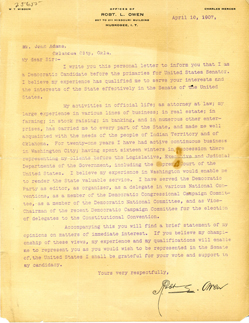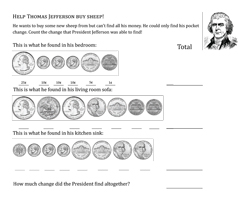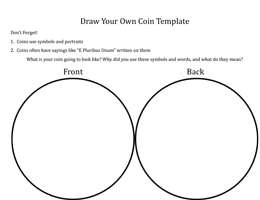Activities
Announce Your Candidacy for the Senate!
When Oklahoma became a state in 1907, one of the first orders of business was electing the representatives the people of Oklahoma were sending to Congress. In that first election, there were seven candidates for Senator, and Robert Owen received the most votes of all of them. Before he was elected, though, he had to announce his intent to run for the seat. In those days, it meant writing letters asking for support from people in the coming election, a lot like how a person can write a cover letter to apply for a job.
Here is a copy of a letter Robert L. Owen wrote to a constituent, asking him for his support in the coming election. Read it carefully, and note how the future senator creates a strong argument for supporting him. Now, write a letter announcing your own candidacy for the senate.
Remember:
- Create a strong argument for support
- Be polite and brief! You are trying to win voters, not lecture them to sleep!
- Remember to structure your argument well. You want the reader to conclude that you are the best option for the job. What evidence do you have to convince them of this?
- Think about the qualities you see in a good leader, and use examples from your own life of experiences that show those qualities within you!
Debate!
The Federal Reserve System is the product of years of work by the members of Congress. A lot of that work included debating the merits of differing ideas about money and power. You can use the information in this website, and any of your own research, to have a debate with classmates about the Federal Reserve, or you can choose your own topic to debate. Like, which ice cream flavor is the best? Or, should the voting age be lowered to 16? Or even, is homework an effective educational tool?
Here are some important rules for debating:
- A debate is a controlled discussion where two opposing views are expressed in order to convince an audience to take one of the views as their own. One side should go first, and present their argument in five to ten minutes. The second person or group can then respond while presenting their own argument in five to ten minutes. The first group should then be given no more than five minutes to rebut the second group’s position.
- The topic of the debate should always be the focus of your statements. You should not direct statements to your opponent(s), but you can address the statements they have made. Always be polite. You are having a discussion, not a shouting match. You should also save your comments for your allotted time, and do not speak during your opponent’s time.
- Take time to write out your statements and practice speaking them. Presentation can have a strong effect on how well your audience understands or receives your argument.
- Make sure you pay attention to what your opponent is saying. He or she may make a mistake you want to address during your time to present.
Here are some questions to help you decide what position you want to take if you decide to debate the creation of the Federal Reserve System:
- Is there enough evidence that a central bank is necessary, or a good thing?
- Does the structure of the Federal Reserve System make sense? Or are there other ways to organize a central bank that make more sense? Why, or why not?
- Does the government have too much or too little control over the actions of the Federal Reserve?
- Should the United States government be involved in the market economy at all? Why, or why not?
Counting Coins




